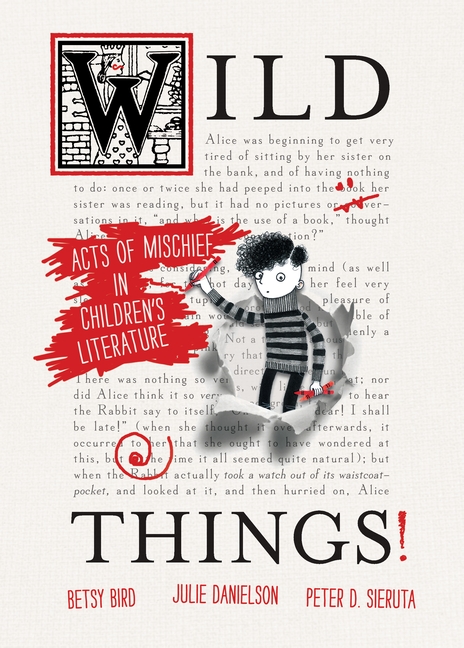Wild Things
 Wild Things: Acts of Mischief in Children’s Literature, by Betsy Bird, Julie Danielson, and Peter D. Sieruta; Candlewick Press, 2014, 272 pp.
Wild Things: Acts of Mischief in Children’s Literature, by Betsy Bird, Julie Danielson, and Peter D. Sieruta; Candlewick Press, 2014, 272 pp.
From the opening anecdote entitled “How Orlo Got his Book” by Dr. Seuss, the reader knows he or she is in safe hands. In short, an uncle is looking for a book for his nephew who wants to be a rhinoceros hunter. Short on books about rhinoceroses, he leaves with a book called something like “Bunny, Bunny, Bunny.” Junior then declares “Books stink!”
This irreverent anecdote about one of the most revered names in children’s literature sets the stage for stories about children’s books and their creators that always go beyond the bunny. For example, The Story of Ferdinand was deemed fascist, communist, and pacifist. Virtually every world leader decried the gentle bull. “Gandhi liked it though,” the authors slyly slip in. Click Clack Moo? Pro-union and anti-creation! The Stinky Cheese Man? “Willfully amoral,” sniffed a critic.
Wild Things is more than a catalog of kids’ books’ controversies. We also see the history of subversive children’s literature beginning with Heinrich Hoffmann’s Der Struwwelpeter. Yes, the man who penned the story of Clara and her nutcracker also gave us “a hygienically challenged kid who looks a lot like Edward Scissorhands on a really bad hair day.” From there, we are treated to a short treatise on children’s books that changed the literary landscape including an insightful examination of the legacy of Edward Stratemeyer/Arthur Winfield/Carolyn Keene.
Wild Things really breaks out of the box in its chapters on GLBT literature and banned books. Children’s books are an unlikely battlefield but authors past and present have suffered for their art. Their stories–James Marshall, Arnold Lobel, Maurice Sendak, Louise Fitzhugh and more–are both riveting and humbling.
Ultimately, Wild Things is a celebration of those mischievous spirits that dare to aspire to write for children rather than descend to them, understanding that in the trials of growing up, no armor is stronger than imagination, empathy, and the ability to laugh.
– Reviewed by Ellen Myrick
